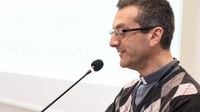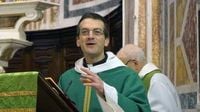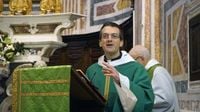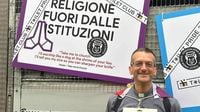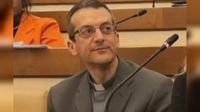In a significant move that marks a profound personal and institutional shift, Don Giulio Mignani, the former parish priest of Bonassola, has announced his departure from the Catholic Church. This decision comes just days after the Easter celebrations and the death of Pope Francis, a time traditionally associated with reflection and renewal.
Mignani, who had been suspended 'a divinis' by Bishop Luigi Ernesto Palletti in October 2022 due to his progressive views on ethical issues such as euthanasia, abortion, and LGBTQIA+ rights, made his intentions clear through an open letter addressed to the Bishop. This letter was also shared widely on social media, reflecting Mignani's commitment to transparency and public engagement.
In his letter dated April 20, 2025, Mignani stated, "I have matured the decision to abandon not only the ministerial priesthood but also my own belonging to the Church. I no longer believe in the 'ontological' value of baptism, considering it a mere rite of belonging to the Church institution. Therefore, I wish to no longer be counted among the 'baptized.'" This striking declaration underscores his deep disillusionment with the Church's teachings and practices.
The former priest's decision followed a lengthy period of introspection, particularly during Lent, which he described as a time to conclude a reflection process that had been ongoing for two and a half years. In his correspondence with Bishop Palletti, Mignani expressed that he had come to feel increasingly distant from the majority of doctrines proposed by the Church, stating, "I feel discomfort and am increasingly distant from most of the doctrines that are proposed."
Mignani's criticisms extend beyond the specific issues of LGBTQIA+ rights and reproductive choices. He articulated a broader dissatisfaction with the Church's doctrinal framework, which he characterized as outdated and unresponsive to contemporary moral questions. He lamented the Church's failure to engage critically with its own teachings, suggesting that many dogmas, including those related to original sin and the divinity of Jesus, are not only implausible but also irrelevant to a mature faith experience.
In a poignant reflection, Mignani noted, "The source of my discomfort is not only how the Catholic Church addresses moral theology issues, such as LGBTQIA+ rights, euthanasia, or abortion. In reality, the entire doctrinal system, elaborated in distant times and never seriously revisited in a critical light, poses a significant obstacle to my faith." He further criticized the Church's hierarchical structure, describing it as an "offense to common sense and reasonableness," particularly due to its dogmatic and authoritarian approach to complex issues.
His journey toward this decision was not without its challenges. Mignani faced considerable pressure during his tenure as a priest, where he felt compelled to navigate the expectations of the Church while advocating for social justice and civil rights. He had been an outspoken supporter of the LGBTQIA+ community and had participated in various social justice initiatives, which had ultimately led to his suspension.
Reflecting on his experience, Mignani remarked, "The long period of ecclesiastical void I have experienced in these two years has finally allowed me to conduct a more free analysis, a more intellectually and humanly honest and objective look at the reality of the Church and the real possibilities of feeling still involved in this context." This statement encapsulates his journey from active participation within the Church to a realization that he could no longer reconcile his beliefs with its doctrines.
In a striking conclusion to his letter, Mignani articulated his new identity, stating, "If it is true that I can no longer define myself as 'Christian' because I can no longer have as a reference 'Christ' as elaborated by the Church over the centuries, I might perhaps define myself more truthfully as 'Gesuan,' recognizing the importance that the figure of Jesus has had and still has in my life." This shift illustrates Mignani's desire to maintain a spiritual connection while rejecting the institutional Church's constraints.
As news of Mignani's departure spreads, reactions are varied. Supporters of his progressive stance have rallied around him, viewing his decision as a courageous stand for reform within the Church. Conversely, traditionalists within the Church have criticized his actions, emphasizing the importance of adherence to Church teachings and the dangers of dissent.
Ultimately, Mignani's departure from the priesthood and the Catholic Church represents not just a personal transformation but also a broader commentary on the ongoing tensions within the Church regarding its response to contemporary ethical dilemmas. His journey reflects the struggles many face when reconciling personal beliefs with institutional doctrines, highlighting the need for dialogue and reflection within religious communities.
In a world where faith and modernity often clash, Mignani's story serves as a poignant reminder of the complexities of belief and the courage it takes to follow one's conscience.
